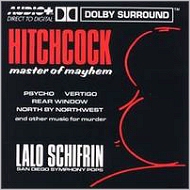 |
Rear WindowFranz Waxman |
|---|
 |
Rear WindowFranz Waxman |
|---|
|
Original music by Franz Waxman, Bernard Herrmann, Lalo Schifrin San Diego Symphony Pops Pro Arte Records, August 1990 13 Tracks, Total Time 57:26 |
Contains an 8:30 minute suite from Rear Window, Waxman, 1954. In addition to Hitchcock films disc also includes music from Dirty Harry, Bullitt, Mannix, and Mission Impossible. |
|
"If you don't experience delicious terror when you see Rear Window, then pinch yourself--you are most probably dead." This Alfred Hitchcock quote aptly describes not only one of the master's finest films but also a score of diversity, drama, and emotion that many consider Franz Waxman's finest. The 1954 thriller had it all: Jimmy Stewart and Grace Kelly, an inventive story titled "It Had To Be Murder" by Cornell Woolrich and the Hitchcock / Waxman team (working together for the last time) in a stylish and captivating film.
Rear Window receives its first recording on this disc in an arrangement by Christopher Palmer taken from the original manuscripts. Composer Franz Waxman, although much identified with large-scale symphonic recording, became increasingly fascinated with the jazz idiom during the Fifties, a preoccupation reflected in a number of his contemporary film scoring assignments, among them his second Oscar-winning score for A Place in the Sun (1951). The opening to "The Ballet" in Rear Window is thought to have greatly influenced the young Leonard Bernstein, later being reflected in several dance numbers in West Side Story (1961).
--STEVE VINING, from the liner notes
Hitchcock: Master of Mayhem.To create the remarkable soundscape for Rear Window, Hitchcock prepared a nineteen-page list of dubbing notes for George Tomasini and the man whose task it was to score the film, Franz Waxman. Waxman, who had previously composed scores for Hitchcock's Rebecca (1940), Suspicion (1941), and The Paradine Case (1947), faced a unique challenge in scoring Rear Window, since each piece of music heard in the film--mostly as popular songs--emanates from the apartments of Jeff's neighbors: "That's Amore," "To See You," "Lover," "Waiting for My True Love to Appear," and "Mona Lisa." The score is also unique in that Hitchcock wanted to use an original song that appears to be in the process of being composed as the story progresses, so that in the final scene the song is heard in its full orchestration, including lyrics, when the Songwriter plays the new recording for Miss Lonelyhearts.
Waxman succeeded in avoiding a conventional Hollywood score, but Hitchcock later complained about the final results. "I was a little disappointed in the lack of structure in the title song ('Lisa')," wrote Hitchcock. "I had a motion picture songwriter when I should have chosen a popular songwriter." Harold Rome wrote three sets of lyrics to Waxman's composition, two entitled "Lisa," after Grace Kelly's character, and one called "Love You." In the film, the first version of "Lisa" is used. The reference to forever dreaming in Lisa's arms heard in the song's final lines is appropriate to the image of Jefferies asleep on the screen.
--STEVEN DeROSA, from
Writing With Hitchcock.
A selection of Rear Window related music.
|
Find Rear Window on eBay.com
A selection of Rear Window in books.
|
|
home: The Film Noir 'net |
back to: NOIR MUSIC |
|
Any comments, additions or suggestions
should be adressed to: The Film Noir 'net / Eric B. Olsen / ericbolsen@juno.com |
Other Web Sites:
History of Horror Hard Bop Homepage The War Film Web Author Eric B. Olsen |